FARMINGTON — Large, dark eyes watch intently as Justa Alpaca Farm owners Brenda Simoneau and Fulton Butler enter the animals’ pen.
“They are super curious,” Simoneau said as 13 male alpacas quickly surround Butler. A large guard dog, a Great Pyrenees named Gypsy, comes first.
The alpacas don’t like to be petted but will come up to see what people are doing or seek treats, she said.
Since purchasing the farm at 998 Farmington Falls Road in December 2011, the couple have enlarged the herd from two to 29 alpacas, 16 females and 13 males.
The males and females are kept in separate pens so they can be registered. The father needs to be known for registration, Butler said.
Six alpacas have been born on the farm. Three are still nursing. Three more have been bred and are in the midst of the 11-month gestation period.
“I’ve never owned a farm. Never thought I’d be a farmer,” Simoneau said. “Now I couldn’t live without the animals. They are awesome.”
It all started with Simoneau’s desire to learn to spin her own fiber. She looked at alpacas, one in particular. Butler bought it and then one for his granddaughter, she said.
Since then, more have been bought from Maine Alpaca Farm in Whitefield where the owners have acted as mentors for the Farmington couple, she said.
In three years, Simoneau, formerly of Chesterville, has learned plenty about caring for her curious critters.
They are used for just about everything — for making clothing, blankets and rugs, and for food — in South America. They cull the herd of those that are not producing good fiber by consuming them, she said.
The couple shear the thick coat of their alpacas once a year. Each animal has a different grade of fiber. The prime coat is used for yarns while second and third grades are rug fiber.
The two breeds on the farm produce different fibers. One has a droopy lock while the other is very crimpy and about 3 to 5 inches thick, she said.
The animal’s body heat does not travel through it, Butler said. Snow on its back won’t even melt.
The yarn from alpaca is warmer than wool, Simoneau said. It’s used for hats, scarves and even long johns for hikers.
The life expectancy of an alpaca can be 18 to 25 years. The herd consumes three bags of grain and 28 bales of hay a week. The hay is harvested on their 20-acre farm, she said.
They chew the cud and have three stomach chambers, she said.
Before and after her work at Hammond Lumber in Belgrade, Simoneau tends the herd and takes care of their health.
“I do their shots, toenails and weights,” she said.
She also helps them with birthing. They are bred with the intention of producing the best animal. Some are sold, she said.
Gypsy lives among them. She walks the fence perimeter before going to bed and barks if she hears something in the night.
“People come to see the alpacas,” Butler said. “Most want to take a picture of the dog.”
Visitors are always welcome, he said.
Butler, a retired police chief for Wiscassett, studied dairy in Massachusetts before his military service and 21 years in law enforcement.
The couple met through their membership in United Bikers of Maine and married last year.
Simoneau has learned not only to spin the fiber, but also dyes some of the resulting yarn and sells it from the farm. A store is being built on the property with plans to open by summer.
“I’m not in it just for money,” she said. “My goal is to make money to help take care of the animals.”
They participate in Open Farm Day in July and Alpaca Farm Day in September. They also take a few alpacas to Topsham Fair where they teach about the animals, she said.
On the second Monday of each month, Simoneau holds a resource time from 6:30 to 10 p.m. at the farm where people are welcome to come knit, spin, crochet or sew.
“It’s just a time to share wisdom,” she said.
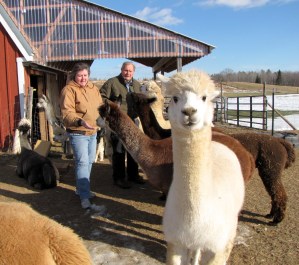
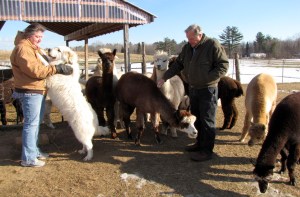
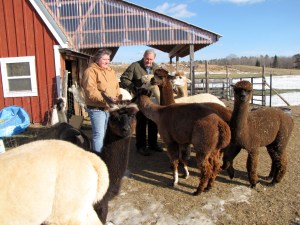
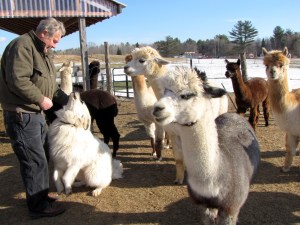
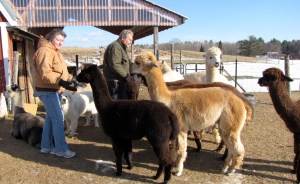
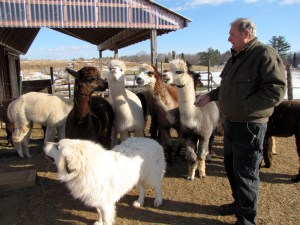
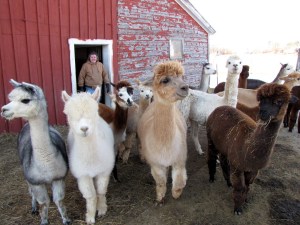
Comments are no longer available on this story